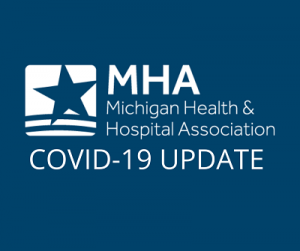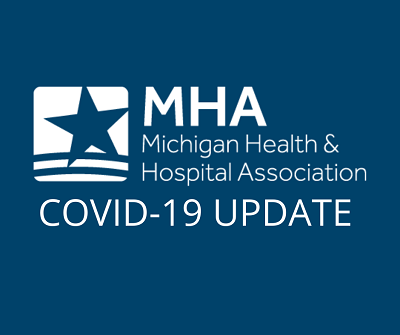
 COVID-19 cases and related hospitalizations have continued to climb in Michigan, with 1,356 adults and 17 children hospitalized Sept. 17 with confirmed cases. The total number of confirmed cases in the state since the pandemic began is nearing 1 million, reaching 988,725 cases that had caused 20,665 deaths as of Sept. 17. Meanwhile, by Sept. 16, just 66.7% of Michigan residents ages 16 and over had received at least one dose of a vaccine to combat the illness.
COVID-19 cases and related hospitalizations have continued to climb in Michigan, with 1,356 adults and 17 children hospitalized Sept. 17 with confirmed cases. The total number of confirmed cases in the state since the pandemic began is nearing 1 million, reaching 988,725 cases that had caused 20,665 deaths as of Sept. 17. Meanwhile, by Sept. 16, just 66.7% of Michigan residents ages 16 and over had received at least one dose of a vaccine to combat the illness.
The MHA continues to keep members apprised of pandemic-related developments affecting hospitals through email updates and the MHA Coronavirus webpage. Important updates are outlined below.
Hospitals May Verify Employee Vaccination Status Through MCIR
The MHA has been working with the Michigan Department of Health & Human Services (MDHHS) Division of Immunizations on changes that will allow hospitals to use the Michigan Care Improvement Registry (MCIR) to verify the COVID-19 vaccination status of employees to comply with state and federal data reporting rules. Hospitals may now use MCIR for this purpose; however, they must submit an additional form. The original MCIR provider agreement was meant for the establishment of a MCIR site for provider/patient relationships and does not cover providers as employers.
Hospitals and health systems that would like to use their existing MCIR site to do employee status checks need to complete the new MCIR Agreement “Provider as Employer” Addendum and send it to the Division of Immunizations Lansing Office as instructed on the Addendum. Before accessing MCIR to verify employee vaccination status, the employer must obtain written employee consent and retain it indefinitely to make available to the MDHHS upon request.
Organizations may also consider setting up a new MCIR site to effectively separate patient vaccination status checks from those for employees. To do so, they will need to complete a new MCIR Provider Agreement to establish the site and obtain a MCIR ID, and then complete the Addendum.
Additional functions for the MCIR system are being explored, and hospitals and health systems will receive additional information when they are in production. Members with questions may contact Ruthanne Sudderth at the MHA.
No Expansion of Expiration Date for Johnson & Johnson Vaccine
The Centers for Disease Control and Prevention has confirmed that expiration dates of the Johnson & Johnson COVID-19 vaccine have not been given an additional extension. Many unused doses will expire soon, and providers are urged to check their inventory to ensure no expired doses are administered. Expiration dates can be found by scanning the QR code located on the outer carton, checking the Janssen Expiration Lookup website or calling (800) 565-4008. Providers should use this vaccine only until the expiration date and then follow requirements for disposal and report wastage into MCIR.
Questions regarding vaccines may be directed to Ruthanne Sudderth at the MHA.
Additional information on the COVID-19 pandemic is available to members on the MHA Community Site and the MHA COVID-19 webpage. Questions on COVID-19 and infectious disease response strategies may be directed to the MDHHS Community Health Emergency Coordination Center (CHECC).
